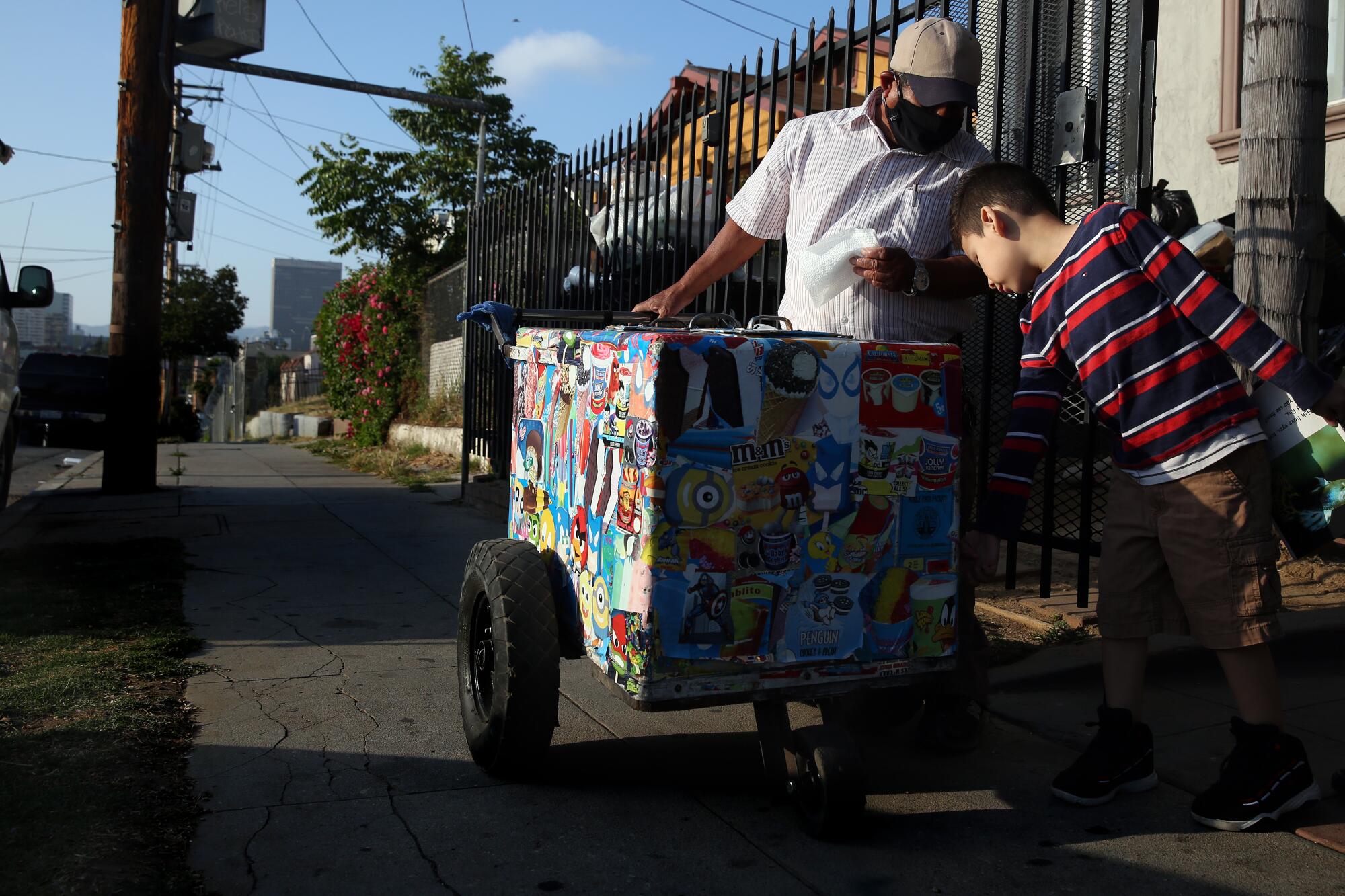
- Share via
For the past 16 years, Mauro Rios Parra has ridden his bike to a warehouse on Washington Boulevard to start his day as a paletero. And every day for 16 years, he’s stuffed the same pushcart with more than 300 ice creams and fruit bars, or paletas: coconut, tamarindo, pineapple, hibiscus, coffee, lemon, mamey sapote, nance and his personal favorites, vanilla and strawberry.
Then there’s the ice cream cups and sandwiches, the Choco Tacos, the Tweedy and Spider-Man and Ninja Turtle bars with gumball eyes.
Under a recent cloudy morning sky, Rios, 63, holds the door of Barahona Ice Cream in Pico-Union wide open. Into the warehouse workers wheel a giant blue chest filled with dry ice and dozens of boxed frozen treats.
Pico-Union is his home and his turf. Tucked a few miles west of downtown, it’s one of the poorest and densest neighborhoods in Los Angeles, with some 45,000 people squeezed into 1.67 square miles.
Given that physical distance is one of the best safeguards against the coronavirus, it has also been one of the hardest hit by the highly contagious disease.
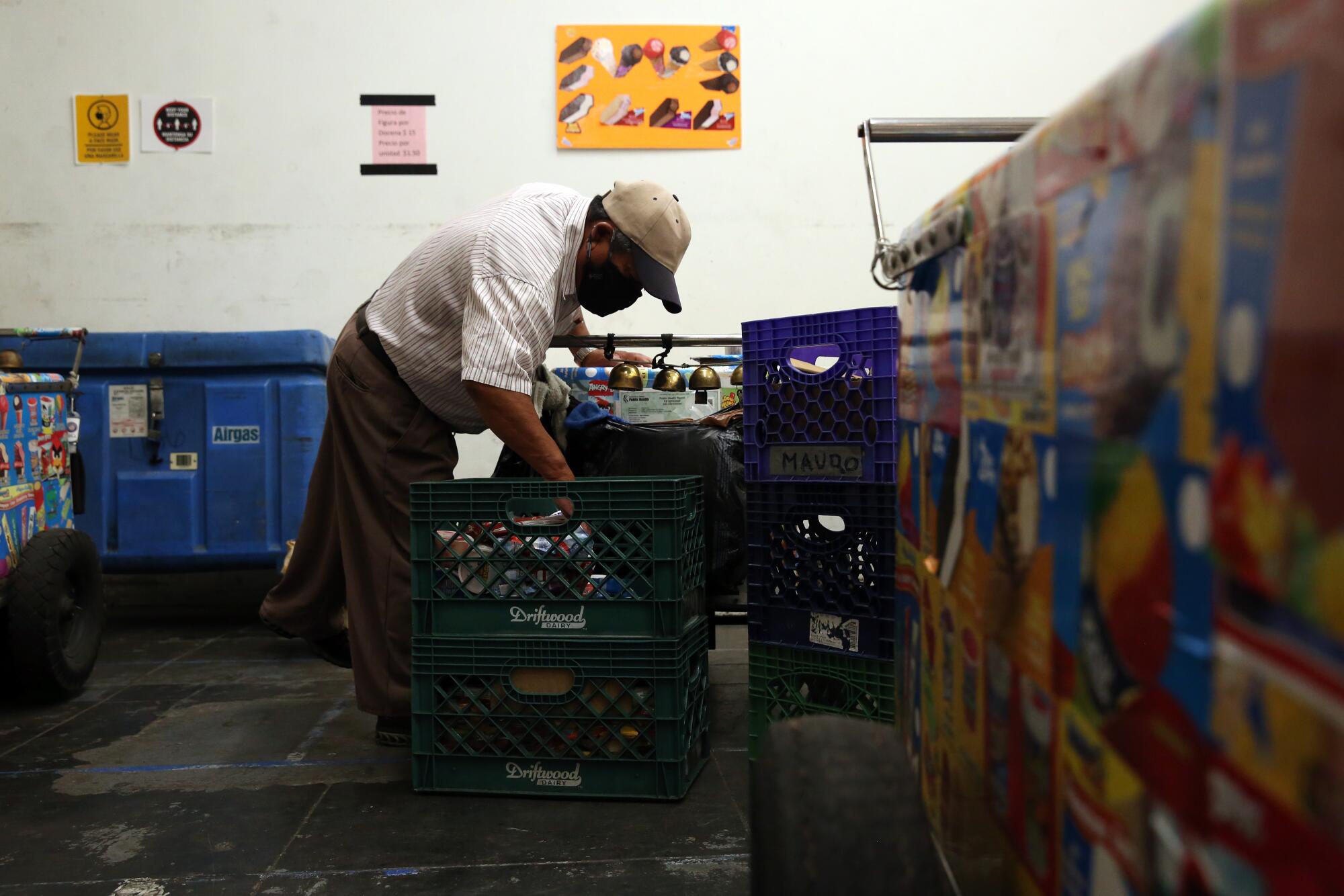
L.A. is a city of street vendors. Bacon-wrapped hot dogs, mulitas, freshly sliced fruits, raspados and corn on the cob are just a few of the tasty delights they sell. But valuable and ubiquitous as they are, street vendors like Rios are also one of the most vulnerable populations in the food community. They are subject to harassment, and many are living in the country illegally. COVID-19 has added another stressor to their livelihoods.
“Pónganse sus máscaras, por favor,” manager Norma Barahona prompts the men wheeling the ice box into the humble, musty warehouse. “Put on your masks, please.” Framed photos of La Virgen de Guadalupe hang on the walls. So do reminders of the disease lurking all about. “Keep your distance,” one sign says in English and Spanish.
Rios unloads an ice-cream-filled milk crate that bears his name. He reaches deep into his cart and tucks each sweet paleta and icy dessert in its rightful place.
“Señor, por qué esta tan callado? Tiene miedo o qué?” Oscar Samano, a fellow paletero, asks a focused Rios. “Sir, why are you so quiet? Are you scared or what?” he quips. “How much did they pay you to shut up?”
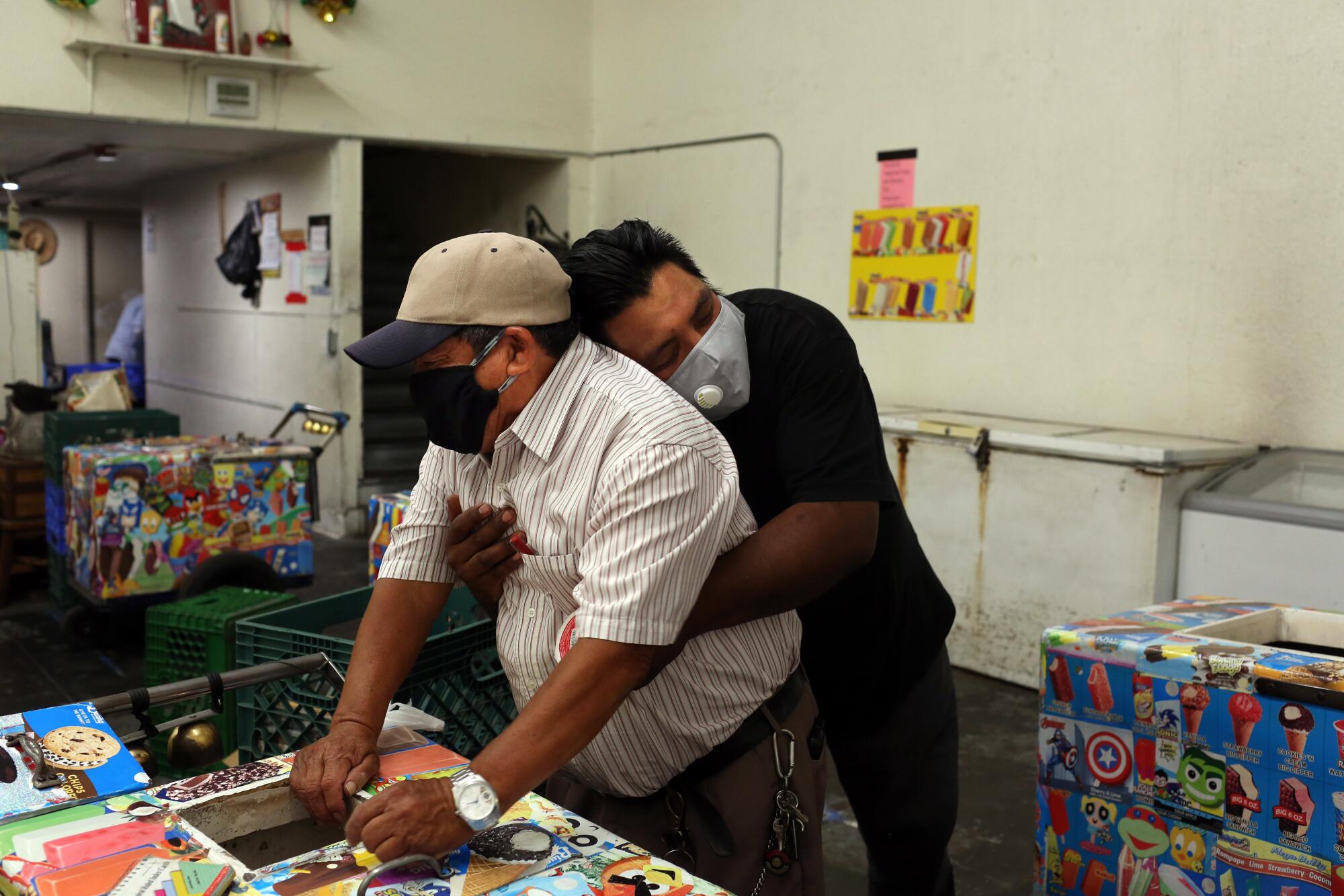
Rios is silent.
On a typical day, he would quip back to Samano, a tall, sturdy man who proudly calls himself “the soul of this place” and playfully dubs Rios his other half.
“I don’t want to hear you calling me ‘my love,’ later,” Samano warns Rios, who responds “mi cielo,” my heaven. They laugh.
At 11:40 a.m., Rios is ready. Wearing a black mask that covers his salt-and-pepper mustache, he closes the lids of his pushcart, grips its handlebars firmly and pushes it down the hall and out of the warehouse, which stands between a church and locksmith.
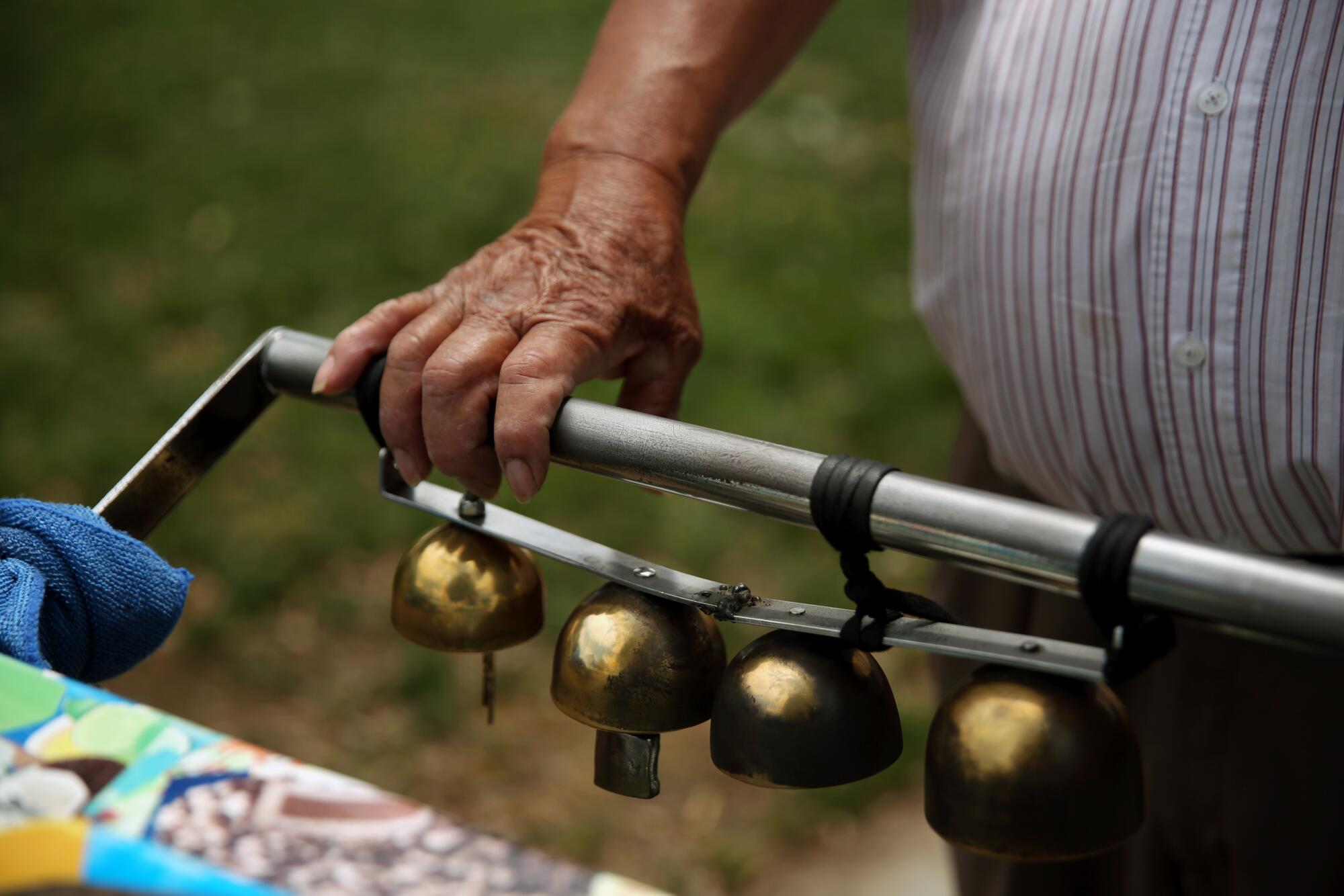
West Washington Boulevard is beginning to wake up. A few steps down, people carry grocery bags out of La Campanita Meat Market.
For the next seven hours, Rios will walk more than seven miles up hills, across streets and past empty schools satisfying the sweet tooth of L.A.’s sweaty masses. The jingle of his bells marks his path.
He likes to make people smile, he says.
These days, it’s a much more difficult task.
**
Rios came to the U.S. in 2002. He had worked at a brewery in Oaxaca, Mexico, pocketing very little money. He struggled to support his wife and three children.
Then he made a difficult decision.
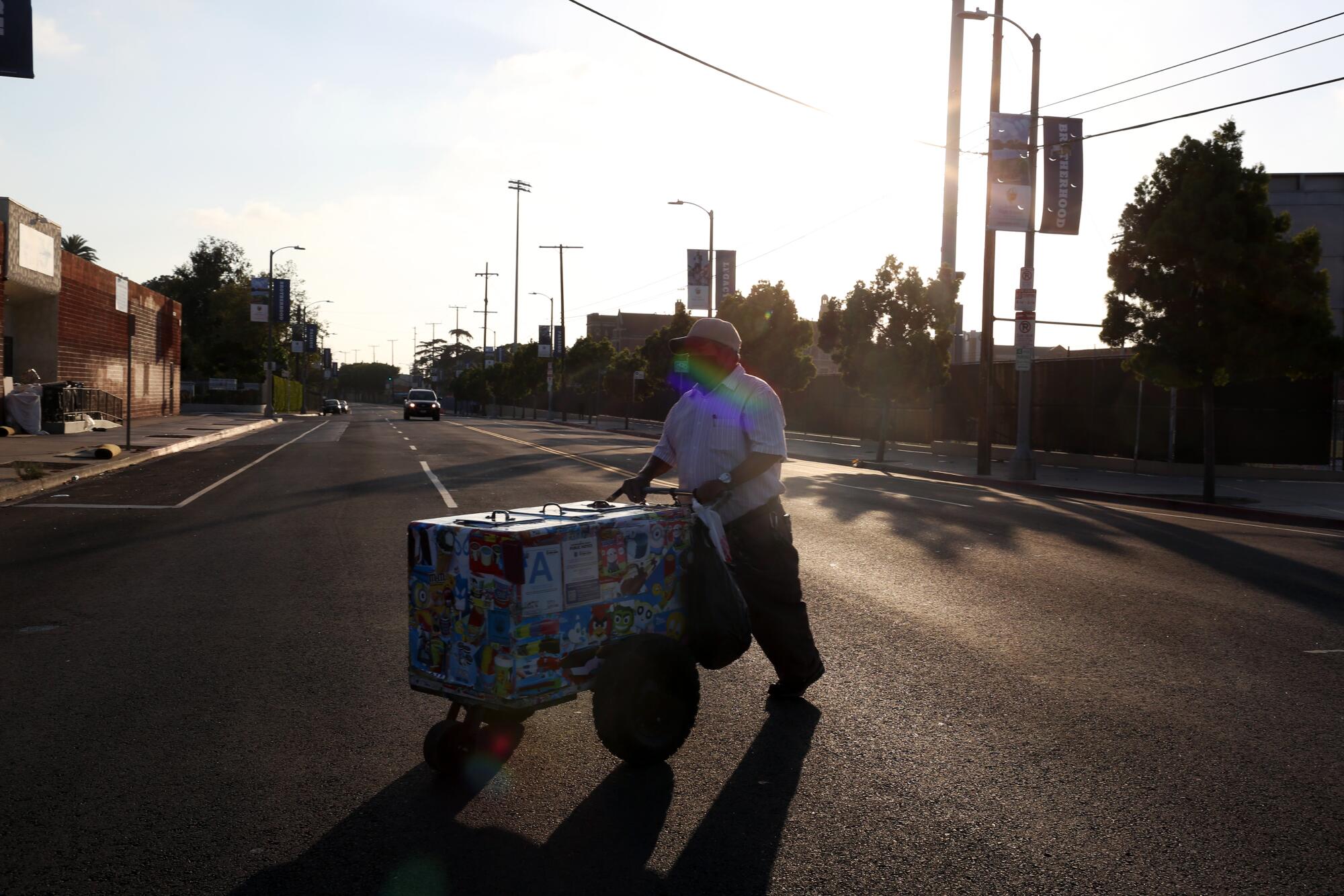
“I’m going to leave so that you can have a better life,” Rios told his children before heading north in search of a job that would pay more. “Study as much as possible. Get ahead in life.”
He didn’t want them to suffer the extreme poverty he and his family of 10 had endured in his hometown of San José Chiltepec. At 13 his father died, and Rios quit school to work. Every day, from sunrise to sunset, he planted chiles, corn, beans, rice and more.
“My life has been nothing but work since,” he says in Spanish.
His mind made up, he sold his home in Oaxaca to pay smugglers and trekked across the desert with about 70 others. His family moved in with relatives.
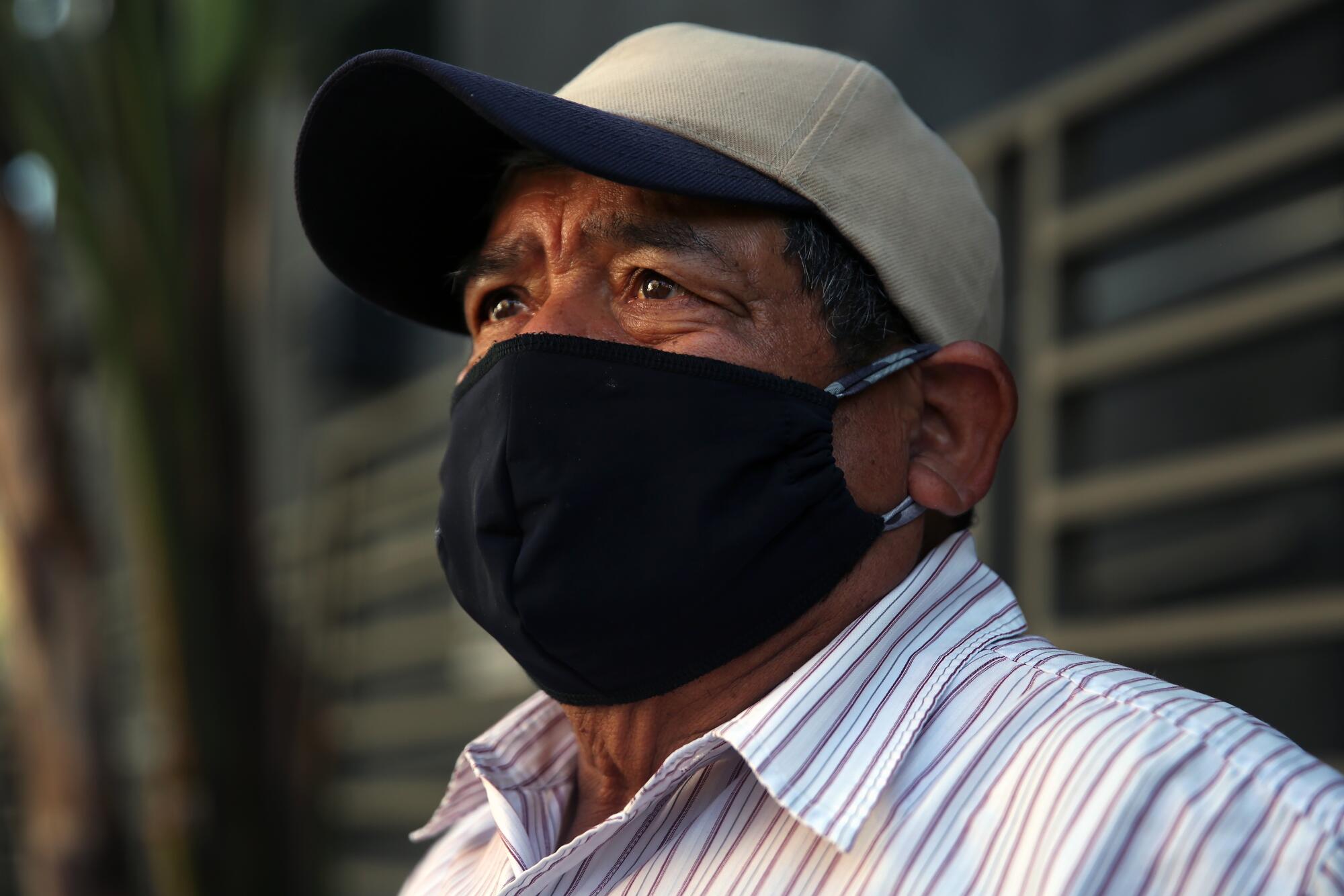
Three people died of dehydration along the journey. More than a week later, Rios arrived in Phoenix, drove to Tampa, Fla., and found a job building benches. He shared a small home with 12 other immigrants. But one night police stormed into their home while everyone slept.
He was locked up in a detention center for a month before being deported. Two years later, he trudged across the border again and arrived in Los Angeles.
“I took the risk a second time out of necessity,” Rios said. Despite working seven days a week in Mexico, there was never enough money. “I came back [to the U.S.] for my children.” At least three times a day, he talks to his now-adult children and Reyna Regina Martinez Hernandez, his “love of 35 years.”
He hasn’t seen his family in 16 years.
**
Rios pushes his cart up an inclined South Berendo Street into a residential area, greeting those he meets. “Buenas,” he says cheerily to a man walking by. Friendliness and communication are key in this field of work. If you want to sell paletas, you have to do it with a smile. Respect and timing are important too.
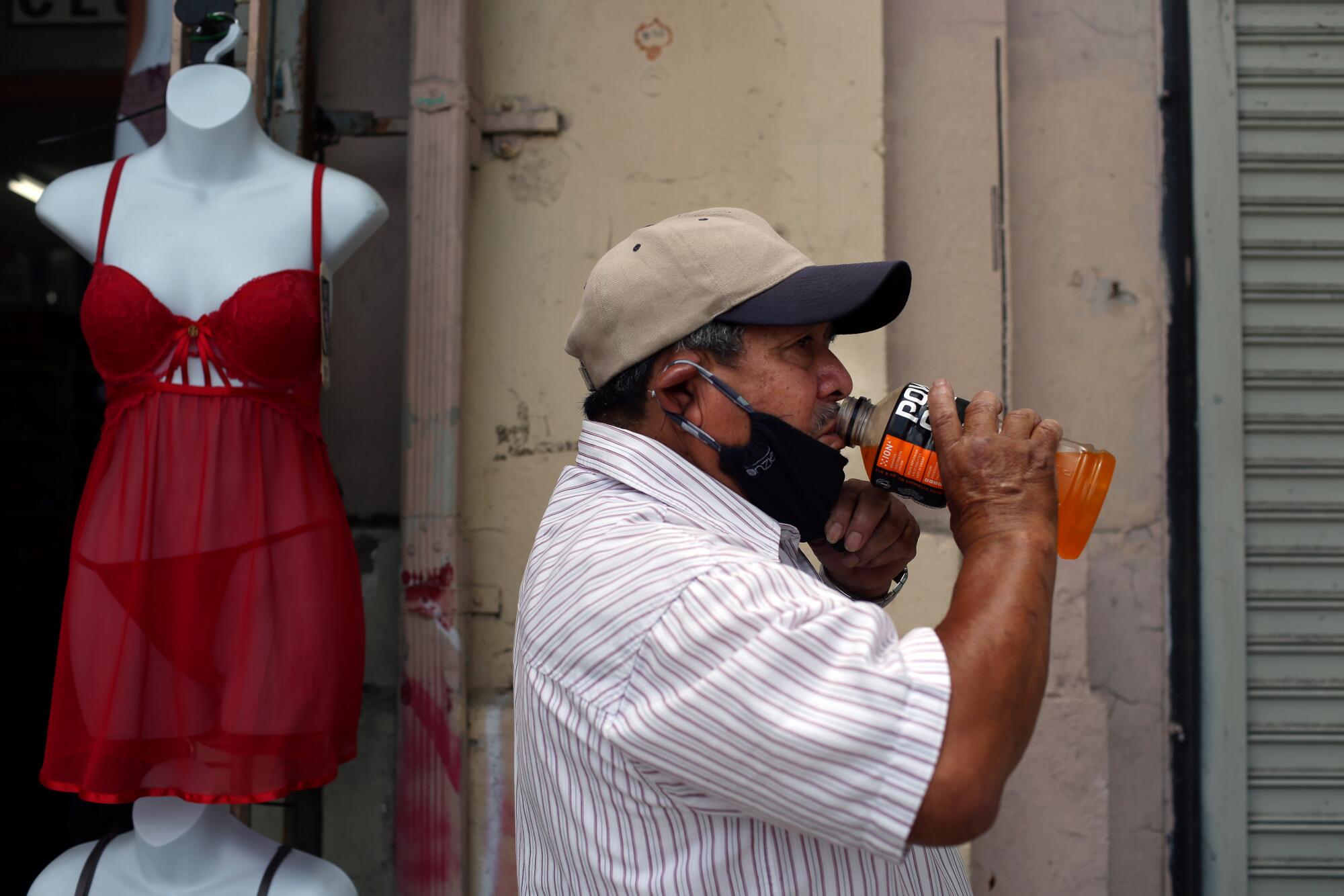
His first stop is a construction site at Loyola High School on Venice Boulevard. Rios rolls his pushcart past the green fence, where a massive machine digs chunks of dirt from the ground. He rings the bells dutifully, but the hammering sounds drown out his jingle. A few minutes later, four workers in hard hats and safety vests make the first purchases of the day.
Rios then rolls his cart half a mile to the Normandie Recreation Center. A young couple sip coffee at a picnic table. People play basketball on the court. A man does pushups nearby while another kicks a soccer ball into a fence. Children chase each other in a recently opened playground. Two elderly women keep watch.
He jingles his bells. No one approaches.
Being a paletero is hard enough in normal times. But during the pandemic, with parks and schools closed and people afraid to leave their homes, much of his clientele has vanished. “Sales plummeted,” he says.
His usual $180 to $250 daily earnings dropped to $120 or less. But Rios doesn’t fear the virus.
“Only God knows what he does with us and what will and won’t happen to us,” he says. “All we can do is take care and protect ourselves.”
**
Everywhere Rios goes, he sees how the city has changed since the pandemic began.
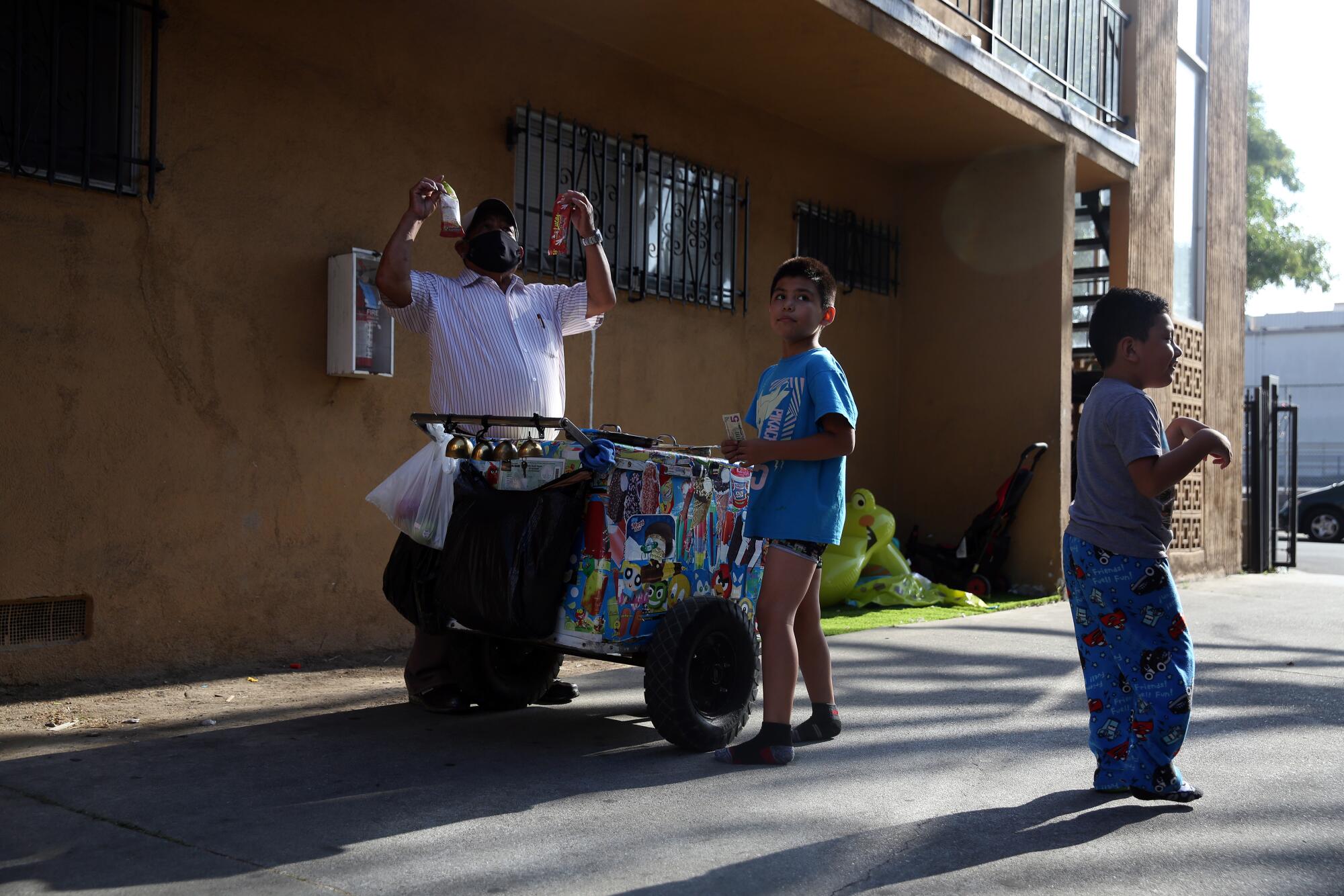
Bars along Pico Boulevard are boarded up with plywood. Restaurants emphasize delivery and takeout only. Churches are shuttered. Bakeries and salons warn customers: “No mask, no service.” But Rios knows where to find customers: Pico-Union’s crowded apartment complexes.
On Pico Boulevard and Normandie Avenue, a man sprints across the street to approach Rios. “Do you have any paletas de tamarindo?” he asks. Just days earlier, he had been feeling ill, and Rios asks how he’s doing. Rios reaches into the cart and gives him a paleta, free of charge. It’s a frequent act of kindness to a man with no money.
Outside a regular’s house blocks away, Rios rings his bells and waits. Silence.
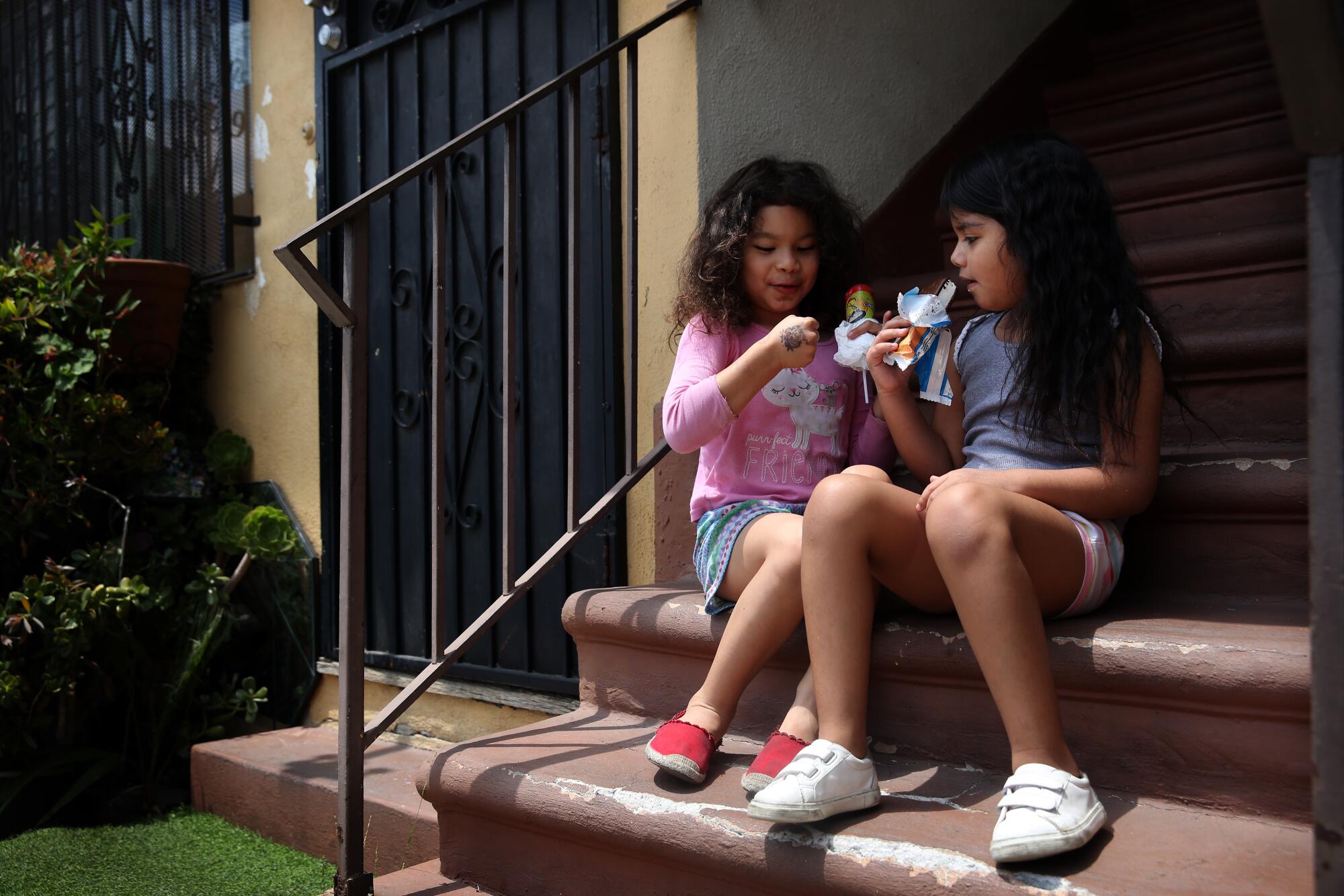
“I’m leaving! I’m leaving!” Rios warns minutes later. Still, no sales. A woman on a bike rides past and yells in Spanish: “How much are the paletas?” She does not stop.
When Rios walks into the parking lot of another apartment complex, his bells immediately attract a customer. The man orders coconut, mamey and tamarindo paletas, “and one of these,” he says pointing to a nutty drumstick. “Muchas gracias.” Rios jingles again.
A woman in a red apron and flip flops walks out of her apartment and orders a Powerpuff Girl ice cream bar with gumball eyes. She holds it up and yells in Spanish to a little girl hiding behind a closed door: “Look, this one?”
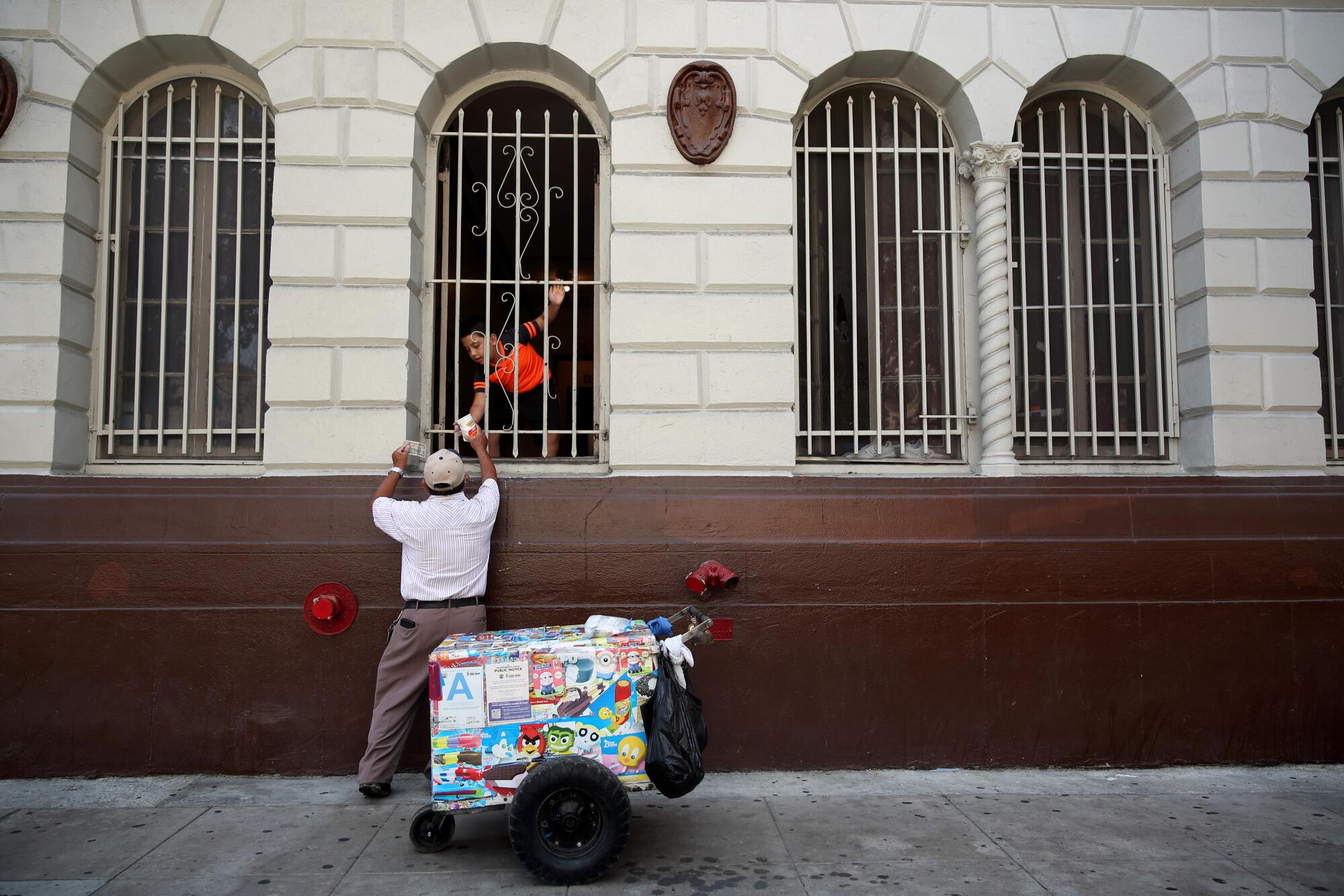
Eulalia Vargas can’t figure out what her granddaughter Mia Estrada, 6, wants. She orders three bars just to be safe. Minutes later, Vargas reemerges with Mia in hand. “She didn’t like any of these!” she tells Rios, his eyes wrinkled in amusement. An ice cream sandwich is what she wanted all along.
“Sin esto no se vende,” he says, pointing to his bells. “Es muy importante.” “Without these, you don’t sell. They’re very important.” The clappers of two bells fell off some time ago, but Rios replaced them with a pair of small keys and a metal lock.
Throughout the day, people old and young chase the song of the bells. He walks miles every day, often under a scorching sun. But he loves his work. “It’s fun and it’s distracting ... and I’m happy doing what I do,” he says.
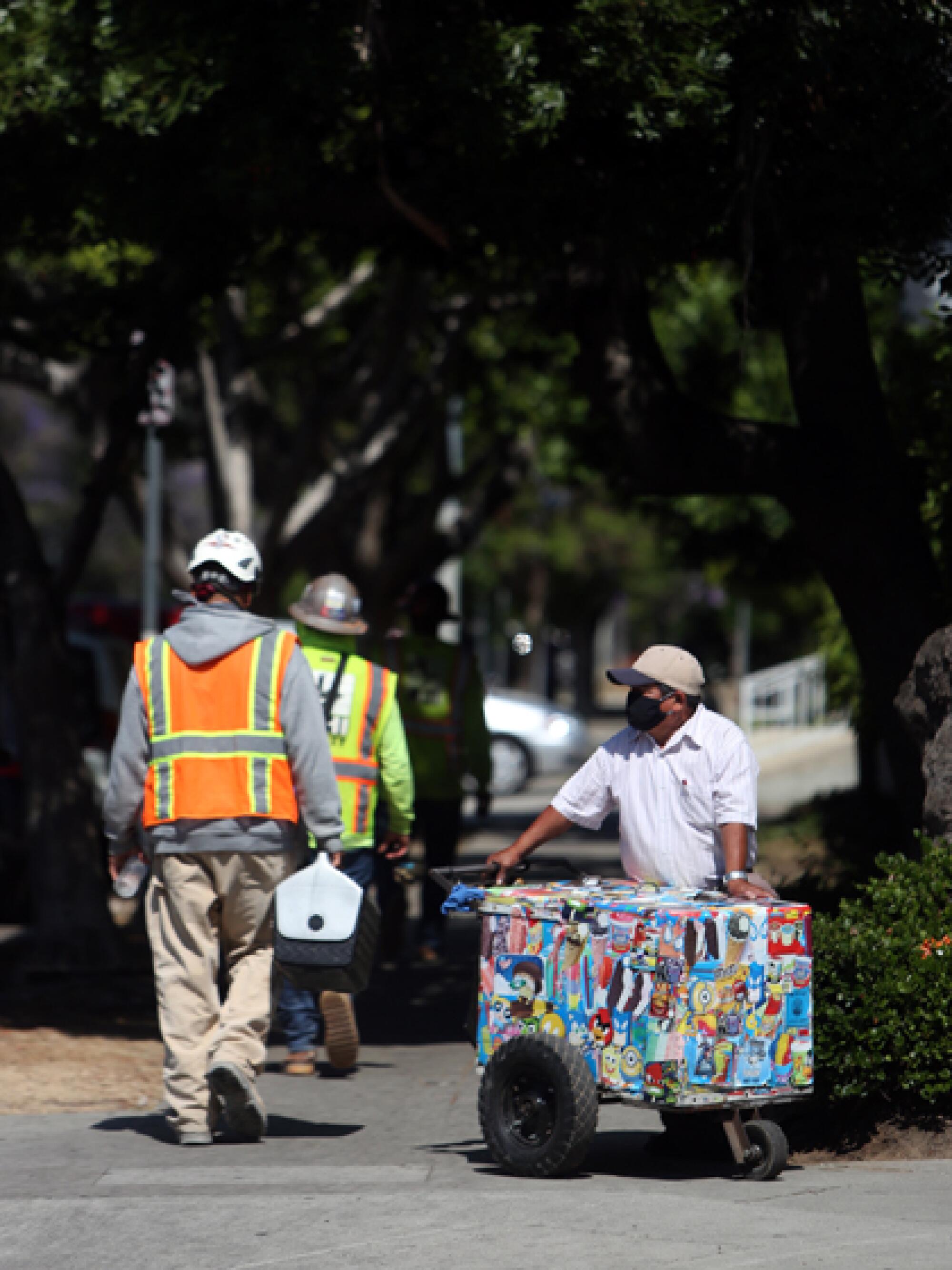
Strangers and regular customers treat him kindly. But it’s dangerous work, he says. Twice he’s been robbed, and he’s fended off three other attempts. He’s learned to stash his earnings in different places.
And he’s adopted this philosophy: “Befriend those types of people so they’re not your enemies.”
By 3 p.m., Rios has made 26 sales, mostly from his apartment visits. But he has more places to be. He checks his watch. In 30 minutes, construction site workers will end their shifts. He heads their way.
**
Four hours later, Rios is back in the warehouse. He empties his pushcart of the desserts he didn’t sell.
He tucks $80 into his pocket, bids his colleagues farewell, and wheels his road bike onto the street. The sky is a Creamsicle orange.
His sacrifices have been worthwhile. His children did indeed study as much as possible. One is a doctor; two are lawyers. In two years, Rios plans to return to Oaxaca. This time, he hopes to stay. He wants to have a garden and a chicken coop. He wants to open his own business, sell roasted pork, Cuban style.
He won’t be a paletero anymore. But he will be with his family.
More to Read
Sign up for Essential California
The most important California stories and recommendations in your inbox every morning.
You may occasionally receive promotional content from the Los Angeles Times.











